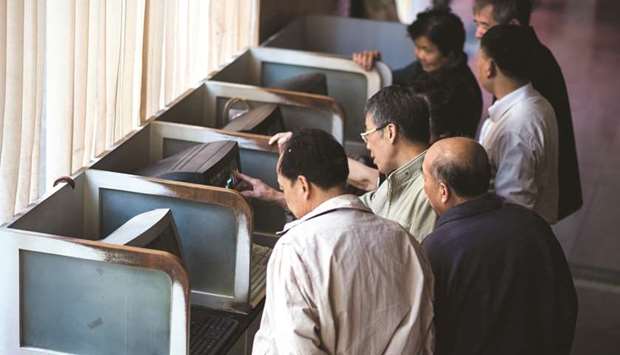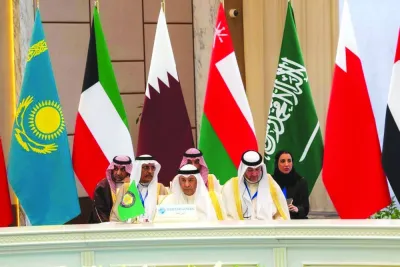While worries about the Syrian crisis and a potential China-US trade war keep dealers on edge, focus has for now moved to the corporate arena as the earnings season gets into full swing.
All three main Wall Street indexes fell on Thursday after a mixed bag of business reports with market giant Procter & Gamble posting lacklustre results, while rising US Treasury yields also spooked investors worried about higher interest rates.
But the big news was a near-3% plunge in Apple, which came after major chip supplier Taiwan Semiconductor Manufacturing Co (TSMC) forecast sales for the present quarter would be about $1bn down on analyst forecasts.
This fuelled concerns that the smartphone sector, a massive driver of revenue for tech firms, including Apple and Samsung, was beginning to wane.
The tech-rich Nasdaq lost 0.8% in New York.
Asia-listed Apple suppliers and other tech firms fell.
In Taipei, market heavyweight TSMC plunged more than 6% and Foxconn lost 1.2%.
Alps shed 1.8% in Tokyo, while Seoul-listed LG Display was off 1.2%. South Korean titan Samsung was more than 2% lower, while AAC Technologies sank 7.3% in Hong Kong.
On broader markets, Taipei was off 1.8% and Seoul was 0.4% lower, while Shanghai slipped 1.5%.
Tokyo ended 0.1% down, while Singapore shed 0.6% and Sydney was 0.2% off. There were also losses in Jakarta and Wellington.
Hong Kong fell 0.9% with real estate firms also hit by worries the city’s moves to support the local dollar will lift interest rates and put pressure on the housing market.
But Manila rose 0.8%, recovering some of Thursday’s sharp losses, though the index is down 10% so far this year on worries about inflation, a weak currency and fears the central bank may need to lift interest rates sharply.
Energy firms dipped slightly following Thursday’s oil-fuelled surge after reports said Opec officials meeting in Saudi Arabia suggested supplies looked like they were coming into line with demand.
That led to worries about an Opec-Russia output cap deal that has supported prices in recent years.
However, crude remains at more than three-year highs, supported by continued Middle East tensions and signs of healthy US demand.
“Saudi Arabia with Opec’s support is looking to draw a new line in the sand for oil prices and added another level of intrigue to the already bullish narrative,” said Stephen Innes, head of Asia-Pacific trading at OANDA.
But he added: “The civil war in Syria and threat of Yemeni rebels targeting the region’s top oil exporter Saudi Arabia with rockets has traders paying the geopolitical risk premium, which should keep downticks in check.”
On currency markets, the pound continued its fall against the dollar after Bank of England boss Mark Carney tempered expectations of an interest rate hike next month following a surprise drop in March inflation.
Sterling had rallied at the start of the week to its highest post-Brexit vote level on bets that British prices had continued to rise last month and rates would follow suit.
“Carney walked back all the hawkishness suggesting interest rates will go up over the next few years but gave no specific timeline which caused anyone who was banking on a May rate hike to head for the exits,” Innes said.
In Tokyo, the Nikkei 225 closed down 0.1% to 22,162.24 points; Hong Kong — Hang Seng ended down 0.9% to 30,418.33 points and Shanghai — Composite closed down 1.5% to 3,071.54 points yesterday.



